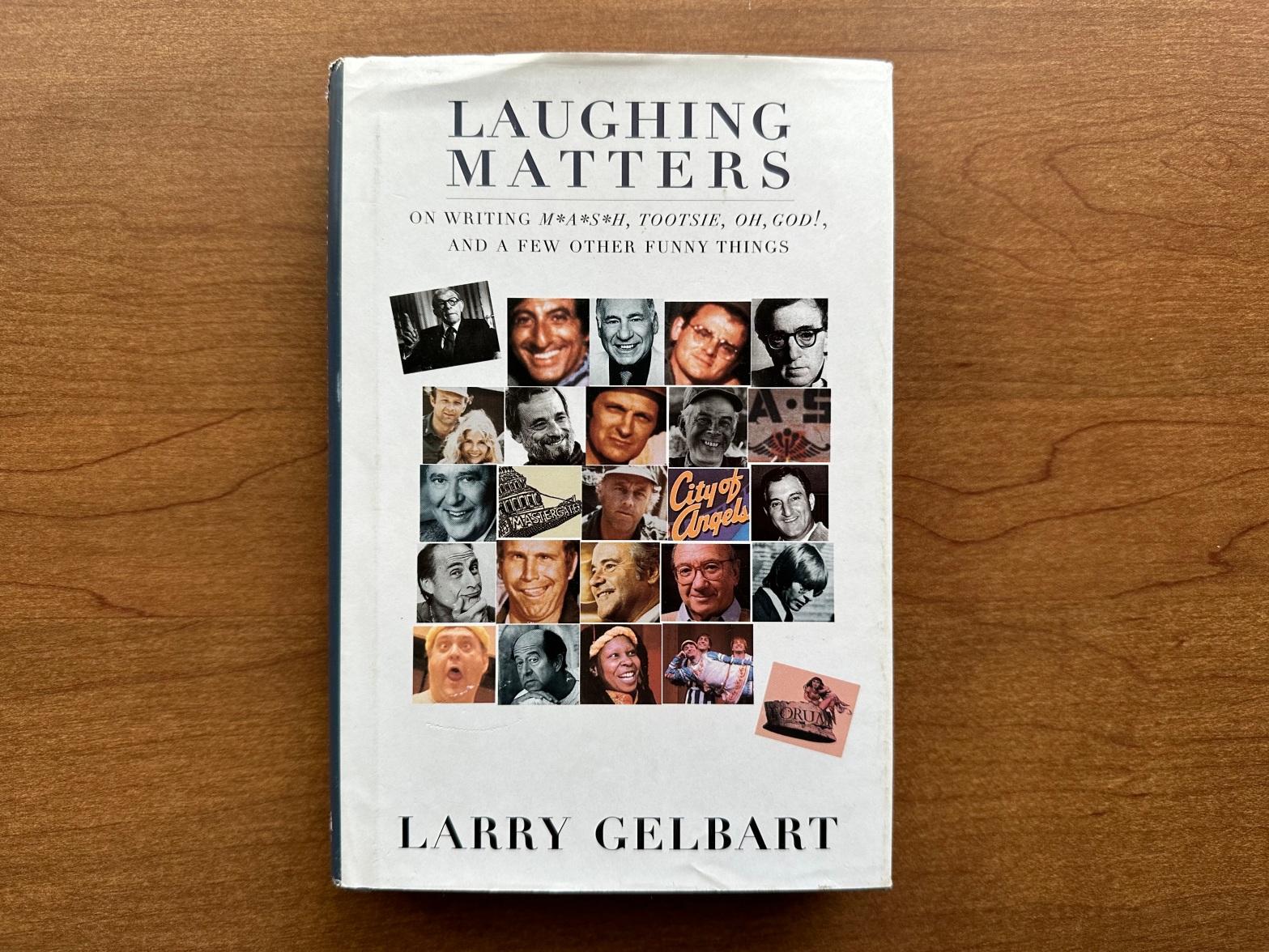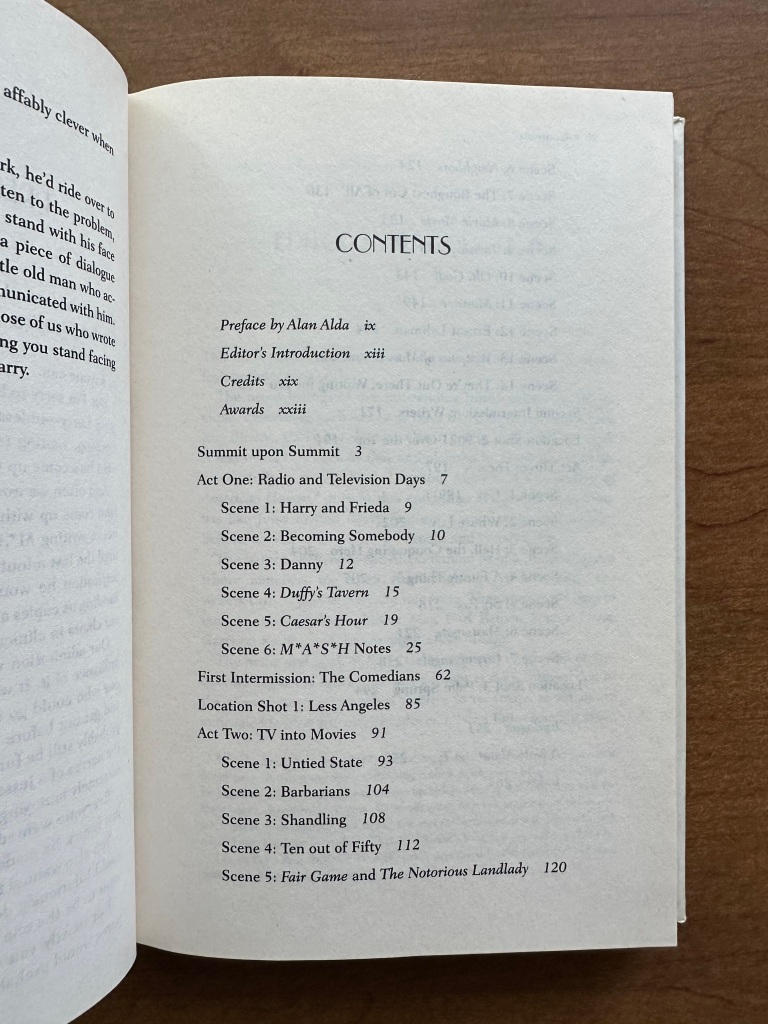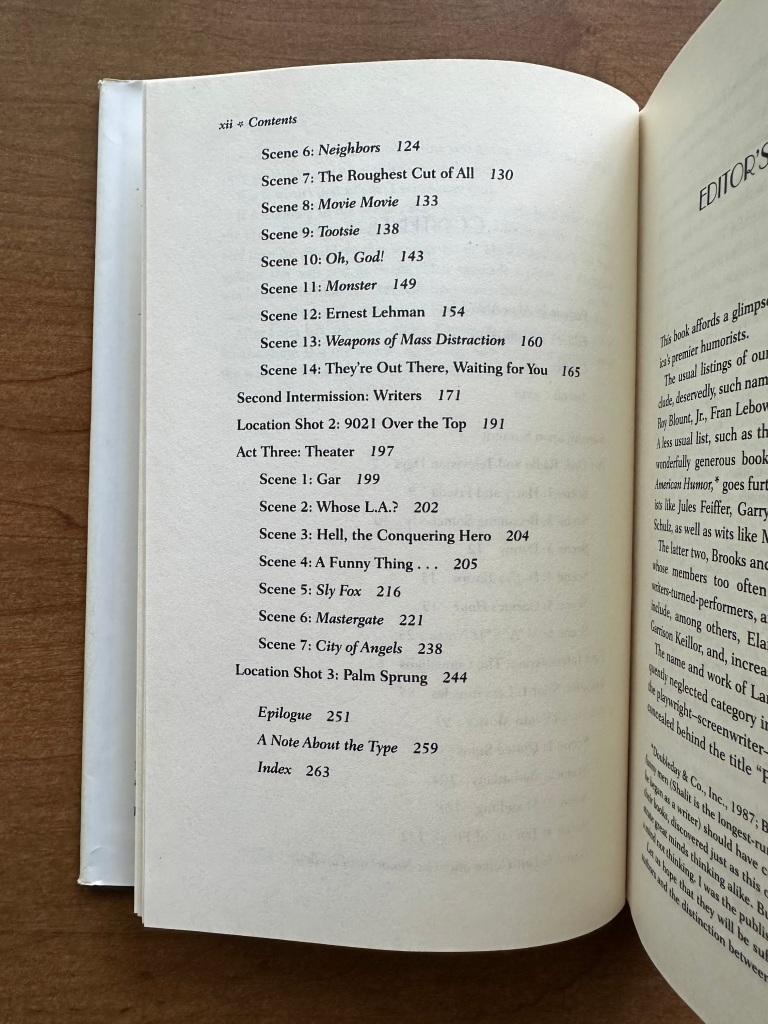What is it?
Gelbart, Larry. Laughing Matters: On Writing M*A*S*H, Tootsie, Oh, God!, and a few Other Things. New York: Random House, 1998.
Why should M*A*S*H fans care?
Larry Gelbart is the comedic and writing genius behind M*A*S*H. He is widely credited with the success of the series and with its longevity. Even though he left the series after its fourth season, his influence on the writers, actors, producers, and everyone he worked with was the driving force behind the show’s success.
As a M*A*S*H fan, what part(s) should I read?
Gelbart had a long, successful career across the mediums of radio, television, film, and theater. He brings the same comedic timing and wit to his memoir as he did with any of his projects. This is one book I highly recommend reading all of it (yes, there are 30+ pages exclusively dedicated to M*A*S*H in act one, scene six). You will not be disappointed.
TL;DR Review
If you were only going to read one memoir from anyone involved with M*A*S*H, Gelbart’s is it. He was first and foremost a writer, and that is evident throughout this book. His anecdotes and insights are what you would expect from the man behind M*A*S*H. Gelbart’s pilot episode and work on the first four years of the series are the genesis of what M*A*S*H became and continues to be to its legions of fans today.
Full Review
After the preface and introduction in Larry Gelbart’s memoir, there is a section simply titled “Credits.” In that section, there is an outline of all of his major credits on radio (8), television (16), motion pictures (11), theater (9), recordings (2), and other credits to his name (3). A review of this list is a collection of who’s who of entertainment history. He worked with radio personalities such as Danny Thomas, Jack Paar, Jack Carson, Joan Davis, and Bob Hope. On television, he was a part of The Bob Hope Show, The Red Buttons Show, M*A*S*H, AfterMASH, and countless others. He was also the writer behind movies such as Tootsie and theater plays including A Funny Thing Happened on the Way to the Forum and City of Angels. Gelbart’s writing spanned all mediums of entertainment. With Laughing Matters: On Writing M*A*S*H, Tootsie, Oh, God!, and a few Other Things, he added author to his impressive list of talents. While this book is a memoir of his life and career, Gelbart’s writing is witty, insightful, and everything you would expect from the man behind the classics. His writing skills set this memoir on a tier above other entertainment memoirs.
After finishing the book, I was struck by the fact that I hadn’t read one book, but three. Gelbart structured the book into “Acts” and “Sections,” as a writer would structure a screenplay. Each of the three major acts follow one portion of his career: Radio and Television, Movies, and Theater. Each of these sections alone is a wealth of information for anyone who hopes to write for the medium. The fact that Gelbart was able to successfully write teleplays, screenplays, and plays/musicals over the course of his career is impressive. Each style of writing has its challenges, and Gelbart discusses them. Most importantly, he discusses how what he learned from medium helped him get into the next. Despite the fact that the book is not wholly chronological, each of the three sections are, and that helps keep the reader on track. Writing a book that goes from the 1990s in one “chapter” and back to the 1960s is next is a challenge, but Gelbart’s writing style keeps it easy to follow.
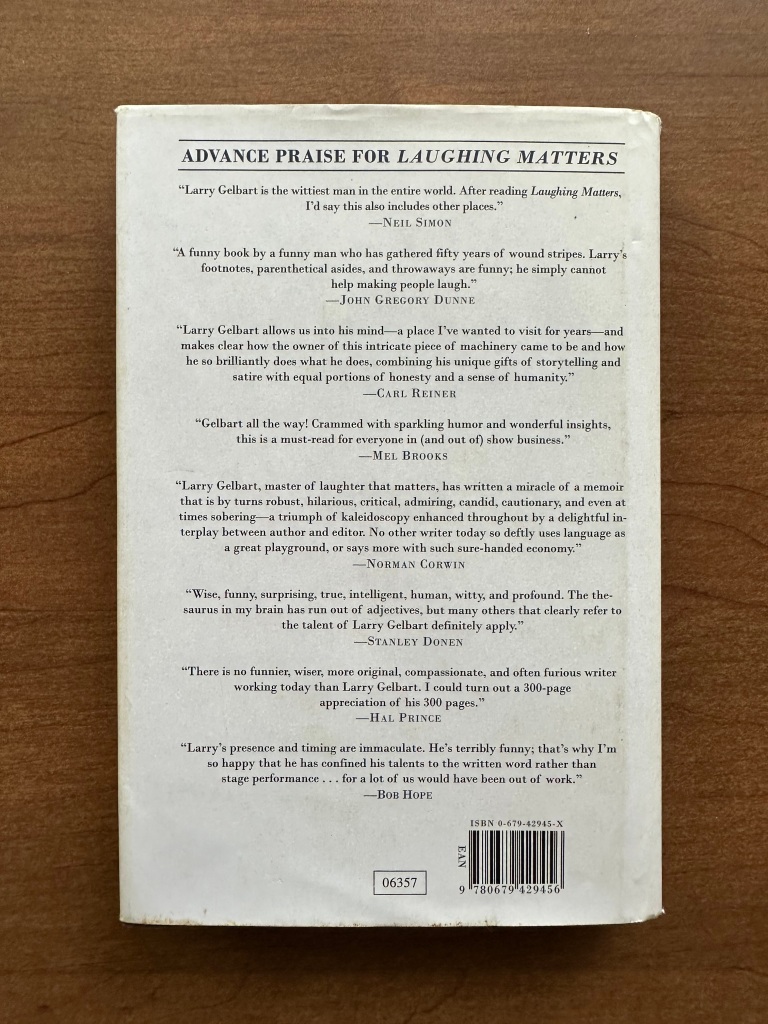
Of course, Gelbart discusses M*A*S*H in great detail. In fact, at 37 pages, his “M*A*S*H Notes” is the longest scene in the book! His thoughts on the series opens with an imagined dialogue between himself and M*A*S*H psychiatrist Sidney Freedman that is very witty and poignant, very much in the form of the series. He then goes on to discuss his thoughts on the Robert Altman film and the challenges of brining the series to television. Gelbart tells the story of writing the pilot and how he had to write it in less than a day because he told Fox that it was already done and in the mail. Thankfully for Gelbart, he lived in London at the time and knew that the mail would take longer, so he finished the script and expedited it to Fox. Once they were able to secure Alan Alda as Hawkeye, the pilot episode was filmed, and CBS picked up the series for the fall of 1972. That’s when the real work began.
Gelbart didn’t want M*A*S*H to be anti-military, but anti-war. He understood that sentiments towards war were largely negative in the country due to the war in Vietnam. The series, like the original film and novel, could capitalize on that. Gelbart also didn’t want to create another war comedy like Hogan’s Heroes or Gomer Pyle, U.S.M.C. He wanted the series to confront the reality of war and show the humanity of the people living through it. Gelbart explains the struggle to find the series’ voice in the first season. Most of the episodes at the beginning of season one had a single storyline. It was “Dear Dad” (01×12) that was the first episode to explore multiple stories at once, and he had to fight CBS over that decision. Gelbart and the M*A*S*H producers had to fight CBS quite a bit over the use of blood in the O.R., the censorship of certain words, and the censorship of certain concepts such as virginity. As M*A*S*H become more successful, they would win more of those battles. Gelbart felt that M*A*S*H found its stride with the episode “Sometimes You Hear the Bullet” (01×17). There is much more about the series discussed including Gelbart’s own stint in the Army, the four-day work schedule for each episode, his and Gene Reynolds’ trip to South Korea to conduct interviews for the series, the thought process behind the episode “The Interview” (04×24), and much more.
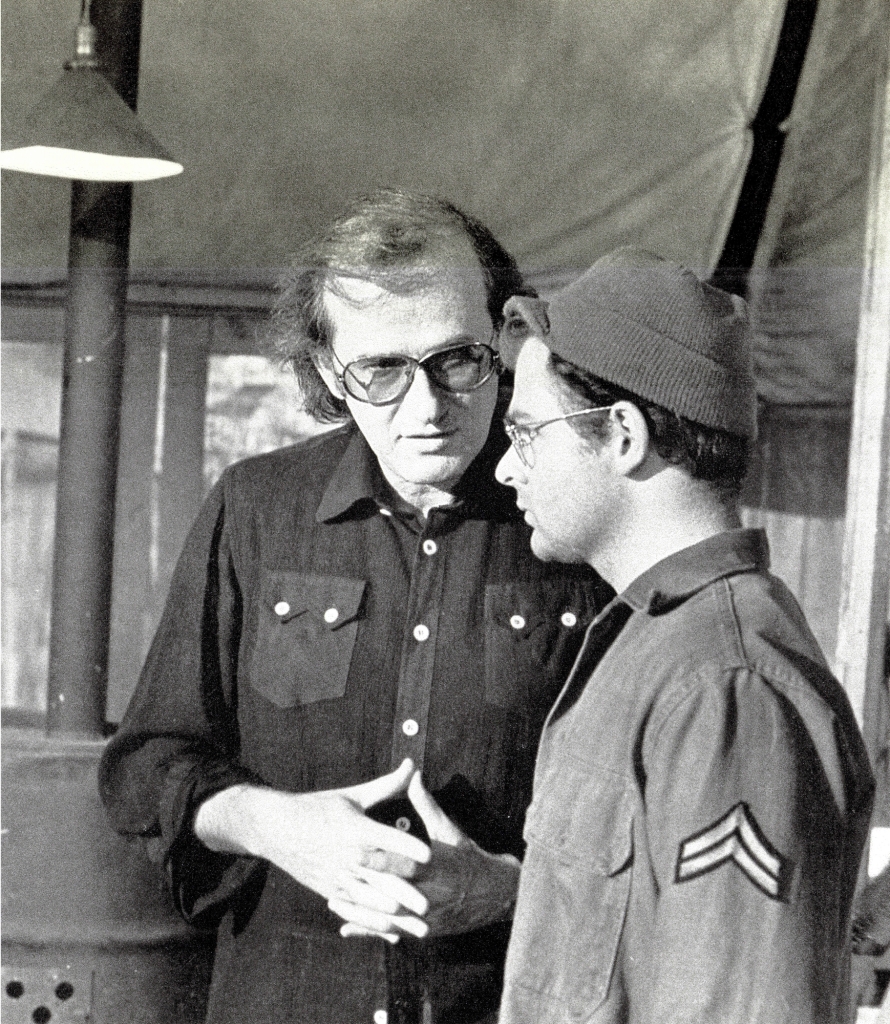
Gelbart concludes his M*A*S*H section by describing why he believed the series was a success. He credits the cast, the writing, the connection to the Vietnam War, and the cinematic feel of single-camera filming process. But I think he left out one of the most important reasons for M*A*S*H‘s success: Larry Gelbart. I have spent the last several months reviewing the memoirs of actors and crew members from the series, and they all have the upmost respect for Gelbart and credit his writing and leadership for making M*A*S*H a success, not only during his four years on set, but also for the years after he left the series. He set the tone of M*A*S*H with episodes such as “Sometimes You Hear the Bullet” (01×17), “Abyssinia, Henry” (03×24), and “The Interview” (01×24). Gelbart and Reynolds did not want the reality of war to get overshadowed by the comedy, and it didn’t. If anything, the comedy complimented it well because many Korean War veterans have stressed how important comedy in their off hours was important to mentally surviving the war. Gelbart’s long, illustrious career across multiple mediums deserves to be celebrated, and Laughing Matters does just that through the brilliance of his writing. Sadly, the book is no longer in print, but pre-owed copies can be found online.

